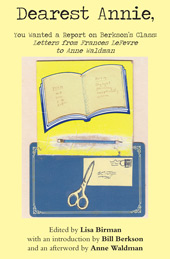
Books
Dearest Annie,
You Wanted a Report on Berkson’s Class: Letters from Frances LeFevre to Anne Waldman
(Hanging Loose Press, February 2016)
Edited by Lisa Birman, With an introduction by Bill Berkson and an afterword by Anne Waldman
Frances LeFevre was a fixture in the downtown New York poetry culture at a seminal time. Her insatiable hunger for the arts had her on a constant circuit of galleries, happenings, theater and always, poetry. When Frances enrolled in Bill Berkson’s poetry class at the New School, she promised to keep her daughter, Anne Waldman, posted on the readings, writings, and discussions. Her letters became a kind of correspondence course, transmitting the energy of the classroom, while also keeping Anne updated on the comings and goings of Frances’s classmates, friends, family, and neighbors. Through these intimate letters, Frances muses on philosophy, narrates cultural events, parses out advice and writing critiques, and engages in inevitable mother-daughter drama.
The collection includes poems, some of which are discussed as writing exercises in the letters. With an introduction by Bill Berkson and afterword by Anne Waldman, this is a rare glimpse into a vibrant moment in US American poetics.
Winner of the Colorado Book Award in Literary Fiction, 2016
(Spuyten Duyvil Press, February 2015)
How To Walk Away is an exploration of post-traumatic stress disorder, obsessive compulsion, body integrity disorder, and the grief of keeping secrets born in war. Otis and Cat, like thousands of young married couples today, are readjusting to life after Otis returns from serving three years in Afghanistan in Operation Enduring Freedom. He struggles with severe obsessive compulsive disorder, and wishes that he carried physical rather than emotional scars from his experience of war. Cat, a genealogist, makes maps of families in an attempt to understand her world. She lost her older brother Tom in a forest fire when she was nine, although she has always kept the secret of exactly how he died. After a car accident takes Otis’s left arm, he is strangely grateful to have suffered a physical loss that makes his damaged emotional self visible. As he recovers, he and Cat are forced to confront the silences upon which their marriage is built.
http://www.spuytenduyvil.net/how-to-walk-away.html
for that return passage – A Valentine for the United States of America
 (Hollowdeck Press, November 2008)
(Hollowdeck Press, November 2008)
Does one fall in love with a country in the same ways one falls in love with a person? How do the borders of a country complicate the borders of a person? What happens when a country breaks your heart? In For That Return Passage: A Valentine for the United States of America Lisa Birman has created a unique collection of poems that seek to answer these questions. Using immigration forms, love letters, memoir, translations, and cut-ups of the US Constitution, The Bill of Rights, The Declaration of Independence and even the language on a one dollar bill, these poems measure the decisions of citizenship against the decisions of love.
Civil Disobediences – Poetics and Politics in Action
 co-edited with Anne Waldman
co-edited with Anne Waldman
(Coffee House Press, 2004)
As cultural absurdities, apathy-inspiring ambient noise, and political and ecological disasters threaten the 21st-century world, art’s role in engaging society and coalescing dissent becomes more apparent and more urgent. Civil Disobediences offers a manual for understanding poetry’s history and enacting its ultimate power to dismantle and recreate political and cultural realities.
Composed of essays, lectures, and teaching materials by leading contemporary poets and scholars, this anthology explores the craft of poetry as well as the history of poetic/political action in the US and abroad, the development of ancient and modern poetic forms, the legacy of world-renowned poets, and the intersections between poetry and spirituality. It also provides concrete advice about bringing poetry into your local community and ensuring that “poetry is news that stays news.”
Contributors: Helen Adam, Ammiel Alcalay, Amiri Baraka, Ted Berrigan, Lisa Birman, Robin Blaser, Reed Bye, Jack Collom, Robert Creeley, Beverly Dahlen, Samuel R. Delany, Steve Dickison, Robert Duncan, Michael du Plessis, kari edwards, Marlowe Fawcett, Lawrence Ferlinghetti, Alan Gilbert, Allen Ginsberg, James Grauerholz, Barbara Guest, Bobbie Louise Hawkins, Anselm Hollo, Laird Hunt, Robert Hunter, Pierre Joris, Joanne Kyger, Laura Mullen, Eileen Myles, Kai Nieminen, Alice Notley, Akilah Oliver, Douglas Oliver, Michael Ondaatje, James Oughton, Max Regan, Sonia Sanchez, Edward Sanders, Eleni Sikelianos, Gary Snyder, Cole Swensen, Arthur Sze, Steven Taylor, Roberto Tejada, Lorenzo Thomas, Anne Waldman, Peter Warshall, Peter Lamborn Wilson














